government effectiveness
Here It Is
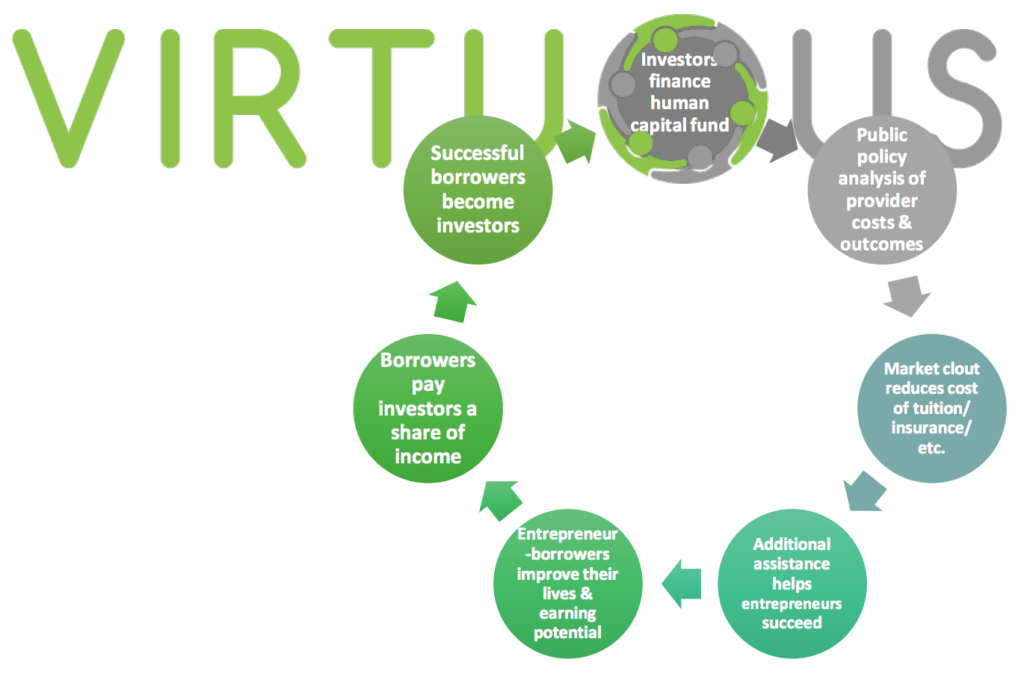 I’ve been promising for several months to give you the details of the idea I’ve been working on the last three years – the business model for what’s going to replace government as we’ve known it for at least the last 2,500 years. Sorry that’s taken me so long … but: Here it is!
I’ve been promising for several months to give you the details of the idea I’ve been working on the last three years – the business model for what’s going to replace government as we’ve known it for at least the last 2,500 years. Sorry that’s taken me so long … but: Here it is!
As I discussed previously, the origins of this idea lay in what I’ve been writing and teaching the last several years about “The Future of Government”: that modern technologies like the Internet, the platform business model, and blockchain, by moving us increasingly into a virtual world where distance, mass and geography matter less and less, are undermining the traditional national state. The question then becomes what replaces nation-states – an issue at the heart of the current worldwide political struggles between globalists and nationalists – and, in particular, What happens to so-called “public goods”?
In economic jargon, “public goods” are non-rivalrous and non-excludable – in other words, my consumption doesn’t deplete the amount available for you, and I can’t “own” it and keep you from using it. Public goods include much that we’ve come to expect governments to provide, such as public safety, public health, social insurance, education – things that create broader benefits for society as a whole, and from which everyone benefits. “Public goods” thus ultimately form the rationale for government itself. What happens to them in a society where technology increasingly allows resources to escape the territorial clutches of governments more easily than ever, and allows us all to opt-out of obligations we don’t want?
 I think they die – unless we can develop a method to capture (or “monetize”) their benefits and share them back to all (and only those) who choose to subsidize them. In other words, we need a profit-making model for public goods. Fortunately, the same technologies weakening nation-states today make possible the formation of voluntary, virtual communities.
I think they die – unless we can develop a method to capture (or “monetize”) their benefits and share them back to all (and only those) who choose to subsidize them. In other words, we need a profit-making model for public goods. Fortunately, the same technologies weakening nation-states today make possible the formation of voluntary, virtual communities.
Investments in “human capital” – education, health care, child development, social insurance – aren’t just liberal, feel-good things: They pay measureable economic “dividends.” For example, the average lifetime earnings of an African-American single mother go up by a half-million dollars if she has five-years of day care for her kids. A child’s lifetime income goes up by $6,000 (in present value) for every year that child has a good, instead of simply a mediocre, classroom teacher. These returns not only pay for the social investment – they’d turn a healthy profit for anyone financing them in place of the government.
Closing the Circle
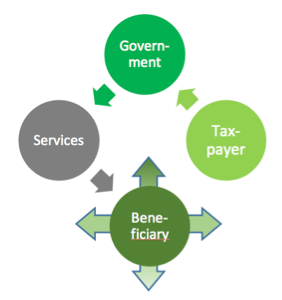
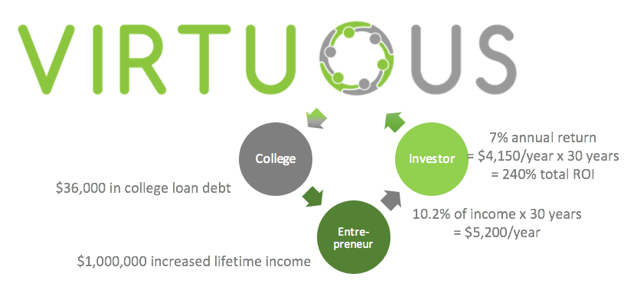
This is easiest to see in the commonly-understood example of return on higher education. Above are two illustrations I frequently use: The way things are today, taxpayers pay for government-provided services that (hopefully) improve people’s lives – but the benefits don’t necessarily accrue observably to the taxpayer. But if we treat beneficiaries as entrepreneurs, in whom we make an investment and then reap a percentage of the “profits,” the increased income alone would pay a healthy rate of return.
Such “income share agreements” already exist in higher ed; my new business, Virtu.us, aims not only to expand their presence but also to bring this concept to financing job training, high-quality child care, various forms of social insurance, and even provision of the kind of K-12 schools every child needs and deserves. All through an easy-to-use app and web portal.
But the concept doesn’t stop there. As the graphic at top illustrates, this model will incorporate policy analysis insights as to “what works” into market assessments of how best to invest in individuals; use the market clout of a growing community-of-interest to drive down the price of these services for everyone; and even expand over time into a wider potential range of “public goods” encompassing, well, virtually all current government activities. Eventually, this becomes a fully-fledged, on-line community – providing the things people want, but decreasingly find today, in real-life communities, let alone the on-line kind.
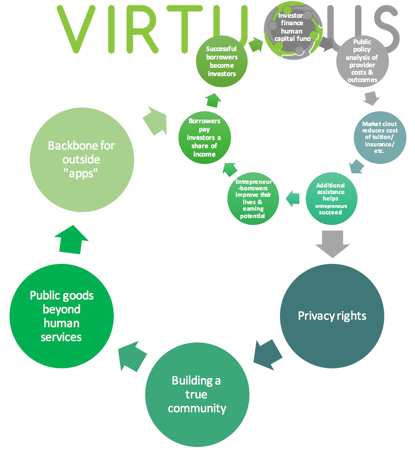 Perhaps you think the idea of private “governments” is terrible. Perhaps it is – but as public institutions as we know them decay, a new alternative will be needed for a very different future. Perhaps you think everything going on today will pass in another two years (or two weeks); perhaps it will – but the economic, political and technological phenomena driving public disinvestment have been going on for the last 40 years, and are occurring today everywhere across the globe. As you know if you’ve been following what I write for the last, oh, decade or so, the need for a new model of public-goods investment – and social progress – isn’t a passing Trump phenomenon: It’s the defining political challenge of our time. Virtu.us is my attempt at an answer.
Perhaps you think the idea of private “governments” is terrible. Perhaps it is – but as public institutions as we know them decay, a new alternative will be needed for a very different future. Perhaps you think everything going on today will pass in another two years (or two weeks); perhaps it will – but the economic, political and technological phenomena driving public disinvestment have been going on for the last 40 years, and are occurring today everywhere across the globe. As you know if you’ve been following what I write for the last, oh, decade or so, the need for a new model of public-goods investment – and social progress – isn’t a passing Trump phenomenon: It’s the defining political challenge of our time. Virtu.us is my attempt at an answer.
If you want to know more, there’s a 60-page white paper online at ericschnurer.com/virtuous: Please read it – I really want your comments and feedback! If you’d like to do more, let me know: We need programmers and project managers, futurists and finance whizzes, analysts and actuaries, marketers and MBAs. One way or another … we need you!
Quick Links:
Also, the last issue left out the link to my recent article about the collapse of the center: http://www.aspeninstitute.it/aspenia-online/article/two-americas-and-lost-center.
Coming next:
An analysis of the 2016 midterms
The role of policy in campaigns
How we helped to strengthen one of the poorest school systems in America
Takeaways from my new course at Brown University on poverty and the future
Again, I welcome your thoughts in the comments below!
And … we’re back
 In case you hadn’t noticed, it’s been several months since I’ve written about, well, much of anything. I’ve been in the odd situation of being terribly swamped while having nothing to report – basically because I’ve been getting a lot of things lined up, which are now coming to fruition.
In case you hadn’t noticed, it’s been several months since I’ve written about, well, much of anything. I’ve been in the odd situation of being terribly swamped while having nothing to report – basically because I’ve been getting a lot of things lined up, which are now coming to fruition.
In my last update, way back in June, I promised that the next installment would be a detailed description of the new business I’m launching – VIRTU.US – a for-profit business intended to represent the “government” of the future.

Finishing that business plan consumed most of the summer, however, a big part of the reason you haven’t heard from me. VIRTU.US is now ready for launch, and you’ll be hearing about it in detail … in my next update. But, for now, I have a number of developments to catch you up on. First and foremost, after several months of discussion, the Greater Good Initiative has a new home – and dates for the second annual Gathering. Please mark your calendar for:
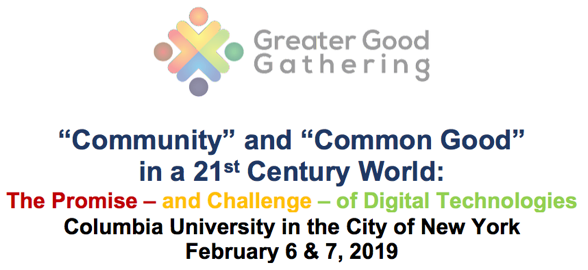
More details in a future update.
I’m also back this fall at my undergraduate alma mater, Brown University (pictured above), teaching a new graduate-level course, “Poverty, Redistribution and the Future of Work.” And I have invitations to teach at several other universities, which, again, I’ll discuss in more detail in a forthcoming update.
I’ve also been busy getting started on a new “boutique” appellate law practice, returning my government consulting work to its original goal of advising top elected officials on policy and strategy, and an exciting international initiative involving the families of Dr. Martin Luther King, Nelson Mandela and Mohandas Gandhi – all subjects for future updates, as well.
Finally, you haven’t been reading much writing from me of late because I’ve hardly done any. As you might know, US News & World Report – for about five years my major outlet, especially for time-sensitive, quick-turnaround analysis – ceased publishing its Opinion section in February. With The Atlantic also undergoing a major shake-up, I’ve spent most of 2018 seeking new writing platforms – and I’m happy to report that I soon will resume publishing more. In fact, a lot more. I’m still sorting out what exactly I will be doing where, since I want each publication to have a distinct “stream” from me, but it now looks like I’ll be writing for the following outlets:
● The Atlantic “Ideas channel,” where I’ll write on policy ideas with national implications, like my last two pieces there – on health care reform, and entitlement programs.
● For The Atlantic “Politics channel,” I plan to tackle the political and governmental implications of the “forces of the future”: global warming; technology-driven changes to labor and capital; the disappearance of truth and reality as we know them; why cyber warfare will require restructuring society itself; how bioscience will radically transform wealth and power worldwide; and the total “financialization” of the economy.
● For The New Republic, I’ll be writing monthly on what I call “Liberalism 3.0” – re-conceptualizing progressivism for the 21st Century.
● Replacing US News, my new quick-turnaround destination for timely commentary on news events will be (thanks to former Governor – and CNN commentator – Jennifer Granholm) … CNN. I’ll also be providing CNN a series I’ve long contemplated – using quirky international cultural features to make broader points about politics and the future (what Sacagawea dollars in Ecuador say about sovereignty, what a wine bar tells you about the break-up of governments): kinda “Anthony Bourdain in reverse.”
● Stratfor, the world’s leading global intelligence consultancy, recently republished a piece I wrote for Aspenia, the journal of the European branch of the Aspen Institute. I’ve now been asked to write for the former on an ongoing basis, where I’ll funnel most of my geopolitical prognostication, while writing for the latter (now my longest-running gig) whatever they ask me to write. In fact, my one piece this summer was a request from Aspenia for thoughts on the collapse of the center in American politics – so I’ll leave you with that:
Politics are no longer really arrayed along a line presenting something of a traditional bell curve, at the center of which lies the vast bulk of the population, forming, well, a “center.” Instead, whatever lines there may be lie on two separate planes that simply don’t intersect. The challenge today is not that, in William Butler Yeats’ famous formulation, “the center cannot hold”: It’s that there is no center anymore.
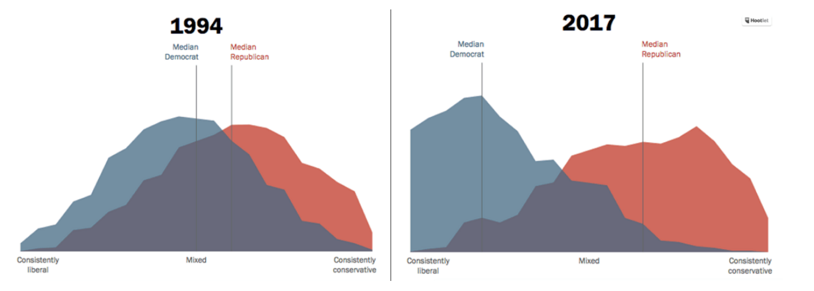
Read the full piece here.
I welcome your thoughts in the comments below.
Hey, You!
 In the weeks since I sent you my last update about the Greater Good Initiative, I’ve heard from, and talked with, many of you about what this initiative could become beyond an annual conference (and we’ve already started planning for the November 2018 installment – more in a future update!). As a result, I’ve made some progress – and now I’m hoping for some further input from you.
In the weeks since I sent you my last update about the Greater Good Initiative, I’ve heard from, and talked with, many of you about what this initiative could become beyond an annual conference (and we’ve already started planning for the November 2018 installment – more in a future update!). As a result, I’ve made some progress – and now I’m hoping for some further input from you.

At the most grandiose extreme, some have suggested to me that the Greater Good should be the beginnings of a new political party. While we certainly need political change – on both sides of the aisle – a new party isn’t really viable under our system (and I’m not the guy to start it). The most “successful” third party in the U.S. was the Progressives … who were so successful they went out of business: The two established parties were forced to co-opt the Progressive agenda, which then essentially became the reigning American ideology for the bulk of the 20th Century. In short, we don’t need an alternative party so much as an alternative agenda that can play the same role in the 21st Century. And that does strike me as a good function for the Greater Good Initiative.
 While such an agenda starts with making government work better to redress injustice and unfairness, it also needs to address a broader range of mechanisms for change and social progress. We need to think of “governance” as something that occurs in institutions other than just the nation-state or the public sector, and “politics” as embracing not just governmental but also market and civil-society interactions (a point I made in this prior update).
While such an agenda starts with making government work better to redress injustice and unfairness, it also needs to address a broader range of mechanisms for change and social progress. We need to think of “governance” as something that occurs in institutions other than just the nation-state or the public sector, and “politics” as embracing not just governmental but also market and civil-society interactions (a point I made in this prior update).
 So I want to make sure that the Greater Good Initiative gets beyond simply political discussion and embraces civic and economic entrepreneurship – a key theme of the first Greater Good Gathering. In recent weeks, I’ve talked with several of the young social entrepreneurs who spoke at the conference (if you haven’t yet, you should watch the video highlights of their presentations) about how best to encourage and support people like them developing non-governmental solutions to social problems. Their answer lies – as in so many areas – in supportive networks of people and information. Some of that comes in the form of incubators and co-working spaces – but it also needs to come through non-location-specific networks. We need to incorporate mechanisms for developing, encouraging and supporting social entrepreneurship – the actual doing of social change – to make this initiative a web of individual actions advancing the greater good, not just calls for a government that does so.
So I want to make sure that the Greater Good Initiative gets beyond simply political discussion and embraces civic and economic entrepreneurship – a key theme of the first Greater Good Gathering. In recent weeks, I’ve talked with several of the young social entrepreneurs who spoke at the conference (if you haven’t yet, you should watch the video highlights of their presentations) about how best to encourage and support people like them developing non-governmental solutions to social problems. Their answer lies – as in so many areas – in supportive networks of people and information. Some of that comes in the form of incubators and co-working spaces – but it also needs to come through non-location-specific networks. We need to incorporate mechanisms for developing, encouraging and supporting social entrepreneurship – the actual doing of social change – to make this initiative a web of individual actions advancing the greater good, not just calls for a government that does so.
 Most people in fact have seen in the Greater Good Initiative some sort of “distributed” process, mirroring the way I’ve argued that technologies like blockchain are going to transform society and all power structures. Nevertheless, the literature on the burgeoning phenomenon of “leaderless movements” indicates they peter out without a well-defined agenda – and that agenda has to come from some sort of “elite” or “leadership.” So the challenge is how to create an agenda with expert input and leadership while retaining the essential character of a distributed, grass-roots movement. Rather than an institutionalized “think tank,” this requires a fluid thought process – assembling experts with diverse views to “think differently” and come up with answers that the political system, with its current no-compromise dynamic, won’t entertain.
Most people in fact have seen in the Greater Good Initiative some sort of “distributed” process, mirroring the way I’ve argued that technologies like blockchain are going to transform society and all power structures. Nevertheless, the literature on the burgeoning phenomenon of “leaderless movements” indicates they peter out without a well-defined agenda – and that agenda has to come from some sort of “elite” or “leadership.” So the challenge is how to create an agenda with expert input and leadership while retaining the essential character of a distributed, grass-roots movement. Rather than an institutionalized “think tank,” this requires a fluid thought process – assembling experts with diverse views to “think differently” and come up with answers that the political system, with its current no-compromise dynamic, won’t entertain.
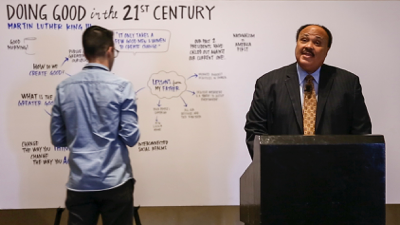 But this also can’t be just an elite-only, centralized process: This must be a process of discussion and dialogue that’s two-way, both vertically and horizontally, in which individuals and groups are free to devise their own agendas and solutions but also out of which broad consensus hopefully emerges – something like a live version of a “wiki” that starts with some sort of thoughtful core but not (like think tanks today) driven by a pre-existing ideological goal.
But this also can’t be just an elite-only, centralized process: This must be a process of discussion and dialogue that’s two-way, both vertically and horizontally, in which individuals and groups are free to devise their own agendas and solutions but also out of which broad consensus hopefully emerges – something like a live version of a “wiki” that starts with some sort of thoughtful core but not (like think tanks today) driven by a pre-existing ideological goal.
Each individual “node” in this network could follow its own model: a local “Greater Good Gathering” organized by folks in Gatlinburg, a monthly meet-up in Minnetonka, a “koffee klatch” in Kalamazoo, a book club in Bethesda, a discussion group in Des Moines, a social enterprise incubator in Inverness, or lone individuals in the Lone Star State, all contributing their concerns and solutions and feeding off the ideas of others in a dispersed national network devoted to building the Greater Good.
 That’s what I’m working on building. How? I don’t know yet – that’s why I’m asking you. After all, that’s what’s gotten the concept this far. Please let me know your thoughts in the comments below or email me at eschnurer@public-works.org.
That’s what I’m working on building. How? I don’t know yet – that’s why I’m asking you. After all, that’s what’s gotten the concept this far. Please let me know your thoughts in the comments below or email me at eschnurer@public-works.org.
Thanks,

Care and Concern
 At the end of each year, I write a think-piece about the state of the world and where things are headed. This year, I was asked to write a longer disquisition than usual by Aspenia, the Aspen Institute’s European journal.
At the end of each year, I write a think-piece about the state of the world and where things are headed. This year, I was asked to write a longer disquisition than usual by Aspenia, the Aspen Institute’s European journal.
That’s now out and you can read the full version – Welcome to the History of the Future – below, but if you don’t want to plough through all of it, here’s the “Reader’s Digest” version: Despite Francis Fukuyama’s famous pronouncement 30 years ago that we’d reached The End of History, “history is back with a vengeance.” Unlike in the past, “[t]he relevant battles, however, will no longer be those between the public and private sectors, or between one nation-state and another: they will be a contest between the virtual or territorial, cooperative or extractive, consensual or coercive, and connected or chaotic.”
Over the last decade, the economy has slowly transformed into one where “clean” cognitive-based industries have mostly banished “dirty” extractive industries and mechanically-oriented work; traditional gender roles and sexual norms have been overturned; formal apartheid has been crushed; liberal internationalism has been declared the only global social system; and traditional warfare (at least between developed countries) has been largely abandoned. It’s shocking to see all that suddenly falling apart at the very moment of its seemingly-unchallenged ascendancy – only if you don’t notice that that’s pretty much how history works. Liberalism is today’s spent force, while reaction is seemingly in the ascendance.
Nonetheless, the very developments driving this crisis pose serious long-term challenges to the alternatives to open, liberal, democratic societies, as well. The crisis of faith across the world is driven by emergent technologies and their attendant double-edged challenges. These will only accelerate in the next decade or two…. The ultimate resolution will likely produce new forms of government, economics and social organization as different from today’s as our world is from the Middle Ages. No one yet knows what these will look like.
How should we respond to this reactionary moment? As I wrote recently in US News & World Report, I spent a good part of 2017 meeting and talking with opposition figures from such repressive countries: Russia, Turkey, Venezuela. One of them – Andrés Miguel Rondón from Venezuela – wrote an article in The Washington Post, “To beat President Trump, you have to learn to think like his supporters,” that everyone should read. As Andrés forcefully concludes, “Trump’s solutions may be imaginary, but the problems are very real indeed…. Showing concern is the only way to break the rhetorical polarization.” I elaborated on this in How to Stop Creeping Authoritarianism:
I would reframe Andrés’ argument in one respect: It’s not a matter of “showing concern” – like George H.W. Bush’s infamous pronouncement, “Message: I care” – where it’s obvious that it’s simply a message and you don’t. Rather, it’s a matter of actually caring.
Liberals and progressives think that by definition they care; like some sort of GEICO ad, “it’s what they do.” But the prototypical liberal response to the challenges of the changing world – train people for jobs more like yours, tell them to relocate to places like where you live, and end their benighted existence by forcibly imposing on them better values more like your own – is by no stretch “caring.” … Rather, as I noted here a few weeks ago, that’s always been the program imperialists impose on the conquered. Since when have progressives ever thought that morally defensible?
Simply attacking Trump and ridiculing his policies is insufficient. You can say all you want that Trump is lying about bringing back coal and manufacturing jobs – it will have no effect: His voters already know this. People aren’t stupid: They know he’s lying. They like that he cares enough to do so – to pay attention to and respect their concerns, and elevate them to the center of his agenda. That’s certainly more than effete liberals do.
I’m not suggesting fighting disingenuousness with more disingenuousness – I’m suggesting the need for honest concern.
I then offered several economic policy prescriptions with which progressives can start – which you can read in the original – and concluded:
Trump hasn’t done and won’t do anything on any of these fronts — and the GOP certainly won’t, either. Instead of criticizing that — and ridiculing voters for not “getting” it — there’s a better solution: Do something about it.
That is, if, as a so-called progressive, you honestly do care.
One thing you can do is to join in the Greater Good Initiative that I discussed in my last update and help us make a difference.
As always, I welcome your comments below.
Quick Links:
– How to Stop Creeping Authoritarianism
– To beat President Trump, you have to learn to think like his supporters
My pieces last year on:
Welcome to the History of the Future
Eric B. Schnurer
 In the past year, the future has come into sharper focus. And it turns out, the future is … history. A quarter century ago, Francis Fukuyama famously wrote that we had reached “The End of History,” with “history” defined as an age-old struggle between repression and freedom, exemplified by liberal democracy, free markets, and human rights. With the fall of the Berlin Wall and the end of the Cold War, both the ideal and reality of freedom had triumphed, and the historic struggle of humanity was completed.
In the past year, the future has come into sharper focus. And it turns out, the future is … history. A quarter century ago, Francis Fukuyama famously wrote that we had reached “The End of History,” with “history” defined as an age-old struggle between repression and freedom, exemplified by liberal democracy, free markets, and human rights. With the fall of the Berlin Wall and the end of the Cold War, both the ideal and reality of freedom had triumphed, and the historic struggle of humanity was completed.
Now, it seems, history is back with a vengeance. The forces of authoritarianism, state-backed economic extraction, and violent intolerance are riding high, both across the globe and in an America that – at least in the Obama years – fancied itself as the liberal paradigm of the future. But the seeds of this seemingly-overnight reversal actually were sown well in advance, and the same, interrelated changes in technology, economics and ideologies mean that the age-old struggle continues. The relevant battles, however, will no longer be those between the public and private sectors, or between one nation-state and another: they will be a contest between the virtual or territorial, cooperative or extractive, consensual or coercive, and connected or chaotic. Welcome to the “history” of the future.
A NEW HOPE (AND CHANGE). Not so long ago, but in a country seemingly far, far away, the United States was a relatively homogenous place. It was not uniform, but it was relatively intermixed economically, socially, and politically (except, of course, in matters of race). Barack Obama’s 2008 election was not so much a departure, however, as the culmination of a large number of long-term demographic, political and economic transformations.
For the better part of a century, the Democratic Party had been the “Party of the People,” representing the interest of working class Americans against the more business-oriented Republicans; it was also a “big tent” party, embracing the disparate interests of conservative Southern whites, prairie populists, urban industrial workers, and, increasingly, racial minorities. (Even the Republicans were somewhat more heterodox than today, encompassing a large number of liberals, particularly on race, as well as far-right fringe elements.) But by a generation ago, Americans were beginning to sort themselves more rigidly by geography, with entire regions and even states largely devoid of one political party or the other. The same was true for such other socioeconomic factors as industrial composition, income distribution, religiosity, and lifestyle, all of which grew highly polarized and segregated by geography. Even while the nation grew remarkably more diverse racially and ethnically, it remained geographically polarized.
By the time of Obama’s election, the Democrats had been remade as a party of coastal, urban, well-educated, multicultural, and well-heeled elites. In contrast, and since Richard Nixon’s day, Republicans had been courting the white working class with appeals to a combination of economic, religious, cultural, and thinly-veiled (if that) racial anxieties. Whatever the emotional appeal, however, this Republican strategy didn’t produce any real support for “anti-government” policies favoring the elite – something Republican leaders didn’t realize until the Donald Trump phenomenon was upon them (and apparently still don’t realize now). The stage was set for both parties to lose their working class base – the Democrats to desertion, the Republicans to a hostile takeover. Moreover, while this analysis focuses on US politics, essentially the same can be said about developments elsewhere.
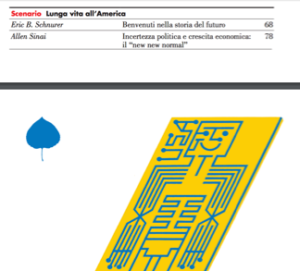 THE EMPIRES STRIKE BACK. The rising right-wing populism and authoritarian politics worldwide have engendered a continuing debate over whether these are driven by racism and other cultural concerns “or” by economics. In truth, these factors are intertwined.
THE EMPIRES STRIKE BACK. The rising right-wing populism and authoritarian politics worldwide have engendered a continuing debate over whether these are driven by racism and other cultural concerns “or” by economics. In truth, these factors are intertwined.
For nearly two generations, the economy has been moving away from skilled human labor, shifting to cognitive skills at one end of the spectrum and unskilled or, increasingly, non-human labor (a product of the cognitive-skill industries) at the other. Over this period, manufacturing regions have been hollowed out and essentially isolated in country after country – just as agricultural regions were during the Industrial Revolution. Those regions connected to this new cognitive economy have prospered, become more ethnically and culturally diverse, and grown closer together while tearing away from their traditional hinterlands. It is as if the continents had been rearranged – just not physically. Economic inequality between countries has been decreasing. But economic inequality within countries – virtually everywhere – has increased.
And all that was before the Great Recession. The Great Recession was this century’s equivalent of the Napoleonic Wars of the early nineteenth or Great War of the early twentieth – the shattering of the world order. Despite growing inequities, the post-Cold War world still supposed a meritocratic social contract under which those at the top at least cared about, and acted in the interests of, those below. The Great Recession destroyed what faith remained in that social contract: the elites – political, social and economic – not only acted in their own venal interest (both in bringing about the crisis and then in bailing themselves out at everyone else’s expense), but they also demonstrated that, when it came to running the world, they didn’t know what they were doing.
THREATENING DEVELOPMENTS. Not surprisingly, those on the outer fringes of these developments have viewed them as running counter to their interests; they see that those people benefiting from these developments (the elites) and their institutions – political, economic, cultural – decreasingly responsive to their needs. Democratic participation has been falling everywhere for some time, along with faith in government, the media, educational institutions, science, and even the idea of truth itself.
The technological changes underlying these developments are notably bringing radical disintermediation to virtually every industry. This makes the current technological revolution different from those of the past, which were centralizing and hierarchical. (The closest comparison might be the invention of moveable type, which made diffusion of knowledge less costly and more widespread, and eventually led to widespread translation of religious texts into the vulgate, the Protestant Reformation, the attendant birth of the nation-state, and the emergence of modern democracy.) Not only is such across-the-board disintermediating, democratizing, and distributing technology laying waste to industries (from publishing, broadcasting and music to real estate, retailing and finance), it is also necessarily changing the nature of wealth, war, and work – not to mention all forms of authority, including those related to expertise, or truth and meaning. It is erasing lines we have long drawn to make sense of our world, between the physical and ephemeral, ourselves and others, right and wrong, truth and falsehood, here and there.
Of course this is threatening to many. It has engendered a reaction: people are seeking refuge in strong states, territorial bulwarks, traditional values, ethnic demarcations, and even extractive (place-specific, non-virtual, low-cognitive) industries. Vladimir Putin’s kleptocracy, an increasingly-statist China, and the resurgent theocracy of isis have all been held out over the past decade as competitive alternatives, even by many in the West. Authoritarian leaders and parties, riding the wave of working class anger, have seized power and entered government around the world. Trump’s shredding of democratic norms, his administration’s promotion of an ethno-state with impermeable borders, and his abdication of global leadership to Chinese and Russian expansionism, it’s the Indian Summer of empire.
RETURN OF THE JEDI? Serious contradictions abound in this rising global reaction, however. Phillip Bobbitt has observed that “terrorism” in every age is simply the mirror image of the corresponding state structure it opposes. Today, the contending alternatives to the emergent power structures of the twenty-first century all reflect the “New World Order” they ostensibly oppose.
The rebellion against globalism is, in fact, global; the counter-revolution against connectedness is connected. The worldview and underlying economic realities of angry young jihadists, aspiring neo-Soviets, Euro-skeptics, and militant alt-right extremists in the United States are not only all remarkably similar, they are also all quite aware of that. Indeed, they are slowly joining in common cause. The contest thus is hardly between the globally-connected and the parochial – it’s between two emerging global parties.
The “alt” groupings, moreover, are not necessarily politically authoritarian (although they are decidedly anti-liberal and at best apathetic about democracy). Like the radical democratizing and distributed nature of the emerging technologies underlying all this, those who oppose the global direction of recent decades tend toward decentralization and libertarianism as much as the fascism of the past. As has been widely observed, Trump needs his followers more than they need him, and the vast bulk of them seem just as aware as his opponents that he’s a hollow fakir. They don’t empower him for his views, but because he empowers theirs. In many ways, then, the anti-elite movements today – radically democratizing and globally connected groups that reject all leaders and institutions – reflect those very technologies that are shaping the world of the future and against which they are rebelling.
In fact, the strong statists are only hastening the decay of nation-states against which they’re reacting. This is evidenced in the still-simmering subnational revolts in the uk, across Europe, and in both multiethnic democracies and autocracies in the developing world including in Russia and China. Nor is the us immune: “Progressive” states and cities are already increasingly bucking the federal government, both domestically and on the international stage. In this era of discontent, the discontentment hardly stops with the state.
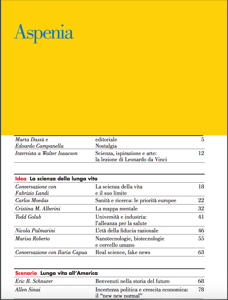 THE FORCE AWAKENS. The European elite has satisfied itself that this post-recession populist nationalism is receding. American liberals similarly console themselves with the belief that Trump cannot possibly win re-election with such abysmal approval ratings (they believe he only won to begin with because of our quirky electoral college system). But this is dubious: Trump’s base is unwavering in its support, while the demographics that most oppose him – the young and minorities – tend not to vote. And there’s an old saying in urban American politics, “You can’t beat someone with no one”; right now the opposition has no one. Not only is there no Democratic contender with the stature, gravitas, appeal and message necessary to improve upon Hillary Clinton’s electoral performance – there is no real Democratic raison d’etre.
THE FORCE AWAKENS. The European elite has satisfied itself that this post-recession populist nationalism is receding. American liberals similarly console themselves with the belief that Trump cannot possibly win re-election with such abysmal approval ratings (they believe he only won to begin with because of our quirky electoral college system). But this is dubious: Trump’s base is unwavering in its support, while the demographics that most oppose him – the young and minorities – tend not to vote. And there’s an old saying in urban American politics, “You can’t beat someone with no one”; right now the opposition has no one. Not only is there no Democratic contender with the stature, gravitas, appeal and message necessary to improve upon Hillary Clinton’s electoral performance – there is no real Democratic raison d’etre.
In part, that’s because the late-twentieth century progressive program has largely triumphed. Over the last decade, the economy has slowly transformed into one where “clean” cognitive-based industries have mostly banished “dirty” extractive industries and mechanically-oriented work; traditional gender roles and sexual norms have been overturned; formal apartheid has been crushed; liberal internationalism has been declared the only global social system; and traditional warfare (at least between developed countries) has been largely abandoned. It’s shocking to see all that suddenly falling apart at the very moment of its seemingly-unchallenged ascendancy – only if you don’t notice that that’s pretty much how history works. Liberalism is today’s spent force, while reaction is seemingly in the ascendance.
Nonetheless, the very developments driving this crisis pose serious long-term challenges to the alternatives to open, liberal, democratic societies, as well. The crisis of faith across the world is driven by emergent technologies and their attendant double-edged challenges. These will only accelerate in the next decade or two. Advances creating new industries and occupations that generate tremendous wealth for many will also render obsolete large swaths of professions beyond the blue-collar jobs that have so far borne the brunt of change. Capital and credit will become easier to obtain and new ventures easier to launch, while the gains from these will be increasingly concentrated in the hands of a limited few who own the algorithms that represent the new capital. The returns on other labor are likely to decline. Ubiquitous distributed technologies will make it easier for anti-liberal forces to penetrate and “hack” connected, open societies, transforming the nature and territory of conflict. At the same time, it will become easier for individuals to undermine oppressive, centralized systems and regimes and to form their own communities of choice.
THE FUTURE OF HISTORY. The ultimate resolution will likely produce new forms of government, economics and social organization as different from today’s as our world is from the Middle Ages. No one yet knows what these will look like. Hopefully – whether virtual or territorial – the cooperative will prevail over the extractive, the consensual over the coercive, and the connected over the chaotic.
What is certain, however, is that history is only just getting going again.
Hinges of History
 As you know, for the past several years, I’ve been writing about the challenges of illiberal and antidemocratic forces, rising alienation of the failing middle class, and technological changes making governance and social cohesion increasingly difficult. I’m starting to shift more toward trying to sketch out solutions, and actually creating new initiatives that, in their own small ways, may – in the words of an old colleague, Bill Drayton – make a “scratch on history.”
As you know, for the past several years, I’ve been writing about the challenges of illiberal and antidemocratic forces, rising alienation of the failing middle class, and technological changes making governance and social cohesion increasingly difficult. I’m starting to shift more toward trying to sketch out solutions, and actually creating new initiatives that, in their own small ways, may – in the words of an old colleague, Bill Drayton – make a “scratch on history.”
The next few updates will be unveiling the new platforms and initiatives I’ve been working on that I hope will help make more of a contribution. In this update, I want to start with several articles I’ve written recently that begin to spell out the framework for those efforts.
In a prior update, I mentioned my recent trip to Brussels, where I visited both the battlefield of Waterloo and the headquarters of the European Commission. In A Modern Waterloo, I described how a high-ranking Euro bureaucrat responded to my questions about the opposition to European (and, more generally, global) integration with the retort, “It doesn’t matter.” Similarly, “the great and good of Europe could congratulate themselves after Waterloo that the revolt of the lower orders, well, it didn’t matter”:
Those who believed that Waterloo meant they could now get back to ruling subject populations as they had for the previous half-millennium were therefore soon to be sorely disappointed…. The democratizing aspirations of the deplorables so feared by the aristocracy ultimately proved to be not only on the right side of history but also right.

That we’re at the end of another similar fin de siècle is evident even in such seemingly-quotidian issues as the never-ending health care struggle, which, I argued in Life after Obamacare, is really the last battle of the last century and the politics of the welfare state: “[I]n today’s polarized either/or environment, both parties are locked … in a duel to the death between a pre-20th Century vision of a market unpoliced by government and a mid-20th Century vision of government supplanting the market.” Other alternatives will soon overtake both positions “that better reflect the direction the world is headed – one of weakened states where other entities, including businesses, provide more and more of what used to be thought of as government services.”
 Is there hope of resolution in this increasingly polarized society? Yes, but perhaps in diversity more than consensus – if we can learn to live with that. In an Independence Day riff on a Harvard Business Review study (of all things), I spent some time musing on How environmental factors affect our politics. The study discussed in the HBR found that people in more densely-populated areas tend to be more “future-oriented,” which leads to all sorts of behavioral and attitudinal differences:
Is there hope of resolution in this increasingly polarized society? Yes, but perhaps in diversity more than consensus – if we can learn to live with that. In an Independence Day riff on a Harvard Business Review study (of all things), I spent some time musing on How environmental factors affect our politics. The study discussed in the HBR found that people in more densely-populated areas tend to be more “future-oriented,” which leads to all sorts of behavioral and attitudinal differences:
Environmental factors – like community size and density – not surprisingly affect the strategies organisms (like, say, people) adopt … for every other aspect of dealing with their interactions with others. This includes fundamental questions about how to structure those dealings – centralized or decentralized, coercion by law or through social ostracism – and issues that flow from these such as taxes versus charity…, attitudes toward crime and terrorism, receptivity to immigration and trade, regulation of business activities or firearms, in short virtually everything.… Which may mean that, if we are to remain United States, and celebrate many more holidays of shared nationhood and shared values together, we will need to learn better to accept that the other side may be coming from a different place on major issues not because these other Americans are evil or irrational, but simply, well, coming from a different place.
 And that brings me to my piece this week in US News: A Better Future for Democrats: We need to start recognizing both the challenges and the opportunities that an increasingly centripetal world poses to modern ideologies. “The left needs to reconceptualize what ‘government’ – or, more specifically, liberalism – might look like in a post-industrial, post-mass-produced world. The ability to individually customize mass-produced items is the hallmark of the New Economy.”
And that brings me to my piece this week in US News: A Better Future for Democrats: We need to start recognizing both the challenges and the opportunities that an increasingly centripetal world poses to modern ideologies. “The left needs to reconceptualize what ‘government’ – or, more specifically, liberalism – might look like in a post-industrial, post-mass-produced world. The ability to individually customize mass-produced items is the hallmark of the New Economy.”
The challenge for progressivism and liberalism today is not how it can compete with the revival of anti-liberal ideologies of the 1930s with a similarly retro agenda from the ’30s – it is how to further progressive aims like meaningful opportunity, economic security and constraint of the powerful in a world where the traditional enforcement mechanisms of collective action to achieve these aims are increasingly undermined by emerging technologies.
The same technologies that give rise to the challenges also offer solutions. I’ll be discussing possible solutions – and the initiatives I’m launching – in future updates over the next month.
The Great Realignment: Brexit, Trump & The Future
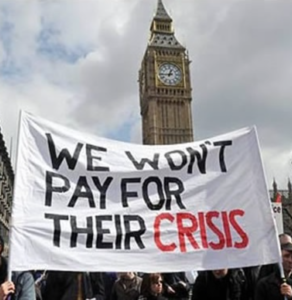 “The real moment of success is not the moment apparent to the crowd,” said George Bernard Shaw. In fact, breakthroughs occur long before they’re perceived. In the last few weeks, Brexit has broken across the globe like a tsunami – but, of course, it is really the result of tectonic shifts in politics, economics and technology that the world has been undergoing for roughly 50 years. These events foreshadow even larger, axial shifts that we’ll recognize over the next 50 years. This is thus a moment in history worth stopping and pondering.
“The real moment of success is not the moment apparent to the crowd,” said George Bernard Shaw. In fact, breakthroughs occur long before they’re perceived. In the last few weeks, Brexit has broken across the globe like a tsunami – but, of course, it is really the result of tectonic shifts in politics, economics and technology that the world has been undergoing for roughly 50 years. These events foreshadow even larger, axial shifts that we’ll recognize over the next 50 years. This is thus a moment in history worth stopping and pondering.
I’ve already sent around the post-Brexit piece I penned in the vote’s immediate aftermath – literally, the morning after. In the past week, I’ve written three more pieces, extending the argument and tying it back to what I’ve been writing over the past several years about this coming phenomenon.
In The Real Brexit Fallout, I wanted to tease out the implications of my oft-stated argument that, “Within a generation, governments will operate in a largely open marketplace for their services.” This raises various, inter-related practical and theoretical problems:
What happens to provision of public goods (things that basically have to be shared, like police protection, national defense or parks and green space)? What happens to provision of “public bads” [like government regulation]? And what happens about inequality (the reduction of which, since it generally has positive spillover effects for everyone else, is coming to be recognized as a traditional public good – paying for which many, if not most, folks want to opt out of, just like public bads)?
German Chancellor Andrea Merkel provided part of the answer in her day-after-Brexit declaration that, “Those who want free access to the European domestic market will have to accept the basic European freedoms and the other rules and duties which are linked to it.” I think this portends the answer we’ll reach as a society as to the “free-rider” problem with public goods: “Of course, if you’re not willing to pay, maybe you shouldn’t be able to use the public roads, miracle drugs or Internet developed largely at taxpayer expense.”
In the final piece of my Brexit trilogy for US News, The Angry vs. The Ascendant, I push back on the overly-simple but now-fashionable argument that Trump and other Republicans are making, that we’re seeing a worldwide revolt against “the Elite.” (Look for a staple of next week’s GOP convention to be attacks on the Clintons, liberals, Mexicans, blacks, and even the poor as part of this oppressive “elite”….) The divide in the world today isn’t between a small elite and an oppressed 99% – it’s basically an even split between those who are part of a “connected” world and those economically left behind. The former live under a system that “isn’t really ‘social-ism,’ as that term has been used historically (although it might help explain the unusual prominence of ‘socialism’ in this year’s presidential campaign) – it’s more like social-ish.” This is rendering all other existing arrangements – including nations and governments as we know them – obsolete:
For the social-ish, borders of all sorts, not just the physical kind, are breaking down – and that’s good…. [T]he internet generation’s belief that privacy comes from ubiquitous transparency, not firewalls, probably also describes the future of physical and cybersecurity, as well, where distributed technologies are likely the future of everything.
But “those angry people outside … don’t feel the same way.” My most recent post, The Great Realignment – for Europe Insight, which asked me to write as a result of my recent speech on all this in Copenhagen – notes that these right-wing populist movements are not anti-government (which is why the conservative elite of the GOP is so alarmed by the Trump phenomenon): “Tea Partiers who rose up against Obamacare because, well, Obama, at the same time railed that the government should keep its hands off their Medicare.” The aggrieved Trump, Brexit, Le Pen and other angry white voters around the world are so angry because “they are turning to the fading nation-state system they have known, and derided, all their lives to provide newly-appreciated ‘rights’ to economic security and protection against their newly-found feelings of victimhood – and finding that, for them, these are no longer there.”
As always, I welcome your comments below.
‘Political Correctness’ Isn’t the Problem
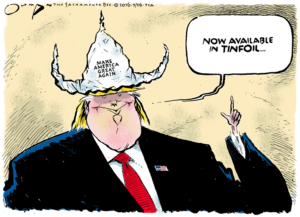 The major event of the last two weeks, of course, has been the horrific shooting in Orlando. We all are saddened by the senseless loss of life, but the incident predictably turned almost immediately into a political football over the issues of terrorism and firearms. These are important issues, of course – but a lot of the commentary around them glossed over the underlying theme of the Donald Trump/Republican reaction, and of the year’s politics more generally: that the greatest threat facing the country is “political correctness.”
The major event of the last two weeks, of course, has been the horrific shooting in Orlando. We all are saddened by the senseless loss of life, but the incident predictably turned almost immediately into a political football over the issues of terrorism and firearms. These are important issues, of course – but a lot of the commentary around them glossed over the underlying theme of the Donald Trump/Republican reaction, and of the year’s politics more generally: that the greatest threat facing the country is “political correctness.”
Facially, the “political correctness” argument of the Right suggests that the US has grown weak both abroad and at home because of liberal-induced unwillingness to deal with – or even utter – so-called hard truths, generally critical of people of color. But, as I wrote in my new piece, ‘Political Correctness’ Isn’t the Problem, in US News & World Report yesterday, the real point such polemicists as Trump and Rush Limbaugh want to make is that the militancy of their anger is really the fault of their opponents:
The spread of intolerant liberalism, which ought to be an oxymoron, however, unfortunately gives the Right in this country – which historically embraces the suppression of speech with which it disagrees – a fig-leaf with which to dress itself up as the defenders of the First Amendment.
So, sure, “political correctness” is a problem. But it’s not what’s stoking Islamic fundamentalism.
Rather, it’s become simply an excuse. An excuse to blame one’s opponent for one’s own venality. An excuse to say even more stupid things, and to elect a fundamentally unhinged man as president, just because doing so is politically incorrect.
This is the big problem of 2016. Last week in US News, I tried to address another aspect of it – the attempt to blame all this anger on immigrants, and what can be done to counter that. In How Clinton Can Win Over Trump Voters, I drew on another meeting from my recent Scandinavian trip in which I discussed immigration policy with analysts from the Swedish Social Democrats. As I wrote there,
[T]he angry working class is right to be angry about jobs and wages: Their jobs have been – and continue to be – threatened. But it’s not because a bunch of immigrants have come over here and taken those high-paying manufacturing jobs. It’s because those jobs, to the extent they still exist, have been shipped overseas. Yes, U.S. jobs are threatened by lower-paid foreigners, but abroad, not in the U.S.
I argued that “American workers deserve a platform that combats the real problems” – and tried in the remainder of the piece to sketch one. The other day, the Aspen Institute asked me to lay out a longer and more detailed version of this argument. Look for it in September!
In between, my trip to Sweden and Estonia produced another piece that I didn’t do much to circulate because it came out right before the Orlando shootings. But in Less Government, More Socialism, I returned to several of my favorite themes on the future of government (basically, “it’s complicated”) and the deficiencies in our current political debate (it’s not complicated enough):
In short, our domestic political debate is grossly impoverished by our dichotomy between the competing utopianisms of a country without government and one dominated by it. We in fact are headed toward a world with a lot less government – and a lot more “socialism.”
And that’s the big problem of the future…. I’ll be discussing it a lot more in articles and posts to come.
As always, I welcome your comments below.
Gaining Global Perspective
 I wrote several weeks ago about my expanding involvement in issues overseas. This week presents a few further examples.
I wrote several weeks ago about my expanding involvement in issues overseas. This week presents a few further examples.
First, I received two invitations from abroad following up on some of work last year. The government of Estonia invited me to come meet with the country’s Chief Information Officer, the director of the country’s “e-residency” program, and various actors from Estonia’s cutting-edge high-tech sector (including Skype). This is the result of an article I wrote a year ago for Foreign Affairs discussing e-residency and its implications for the future of government, citizenship, geographic boundaries, and the coming ability of people the world over to “buy” the government services they want from the provider they choose. There are several innovations there I want to investigate further in person, including Estonia’s more recent efforts to put its entire government in “the cloud” – not just so citizens can more easily access services but so the government can provide those services anywhere, from anywhere, rendering any geographic connection of the “nation-state” superfluous.
I’ve also been invited to head up a panel on the role of policy in politics at the annual conference of the European Association of Political Consultants next month in Copenhagen. The panel will include experts on campaigns and democracy from three continents and will focus on the role that similar issues – the economy, immigration, and terrorism – are playing today in the politics of countries around the world. That’s a subject I’ve been writing about a lot recently for US News & World Report, such as this article from last year.
Both of these themes – the migration of the nation-state to the virtual world and the unity of threats facing voters across the world – come together in the US News piece I wrote yesterday. As the piece argues:
The closer one gets to each side’s core – whether Ramadi and Raqqa, or Brussels and San Bernardino – the more vulnerable that side is…. As in the strange world of subatomic physics, some forces exert more sway at a greater distance, requiring the discarding of traditional, common-sense physical concepts. All of this adds up to a world very different from what Trump, the Islamic State or conventional thinkers recognize…. Walls and borders won’t keep anything out forever; what works, instead, is penetrating enemies abroad while – in seeming contradiction – assimilating them simultaneously at home.
I’ll be reporting on these, and other issues, from abroad next month. As always, I would love to know your thoughts. Please feel free to leave your comments below.
The ‘None of the Above’ Election
If voters made one coherent statement in the midterm elections, it was that they don’t like either party. While Republican candidates routed Democrats in races for national and statewide offices, voters across the country embraced issues and ballot measures favoring Democratic positions such as an increased minimum wage. As frequently happens right after Election Day, media coverage focused on the Democrats’ shellacking while the real story is more nuanced. Read more here.







